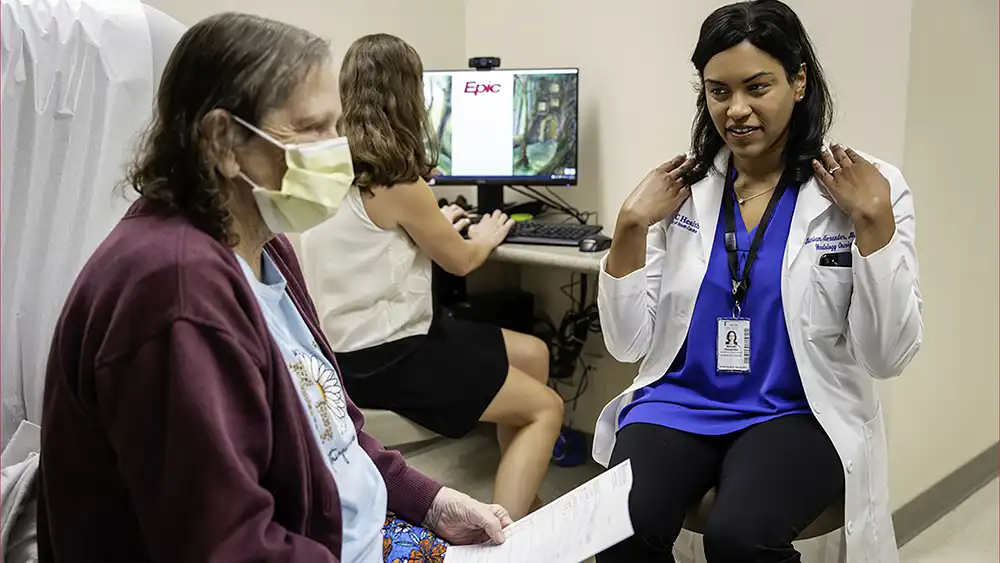
A cancer diagnosis of any kind can be devastating. In terms of lung cancer, a diagnosis of small cell lung cancer is especially so, as the disease has a poor prognosis. It can be hard to detect and spreads easily, making it complicated to treat. But to paraphrase South Carolina’s state motto, “Where there is breath there is hope,” and hope recently got much brighter with a new treatment available at MUSC Hollings Cancer Center.
The words ‘bi-specific T-cell engager,’ (BiTE), may not mean much to those outside the medical field, but this type of targeted therapy, known as tarlatamab, is a game changer for small cell lung cancer patients whose cancer has not responded — or has stopped responding — to frontline treatments like chemotherapy.

“Think of BiTE therapy as having two arms and two targets; one arm grabs the T-cell — or immune cell — and the other arm grabs the cancer cell. Then it brings the two together so the immune cell can kill the cancer cell,” explained Dr. Mariam Alexander, an oncologist with MUSC Hollings Cancer Center. She served as the site leader for part of the clinical trials of tarlatamab, an anti-cancer medication which was approved by the Food and Drug Administration this summer. The treatment is administered through an intravenous line and spreads through the bloodstream, allowing the tarlatamab to attach wherever the cancerous DLL3 cells have spread throughout the body.
Small cell lung cancer only accounts for about 15% of lung cancer diagnoses, but unlike non-small cell lung cancer, which can often be treated with surgery if caught early, small cell lung cancer is fast growing, and available treatments are not known to last.
“Small cell lung cancer must be treated with chemo and immunotherapy if it’s caught at an early stage. But it’s rarely caught at an early stage; more often, it’s diagnosed after it has spread,” said Alexander. She added that while small cell lung cancer initially responds well to chemotherapy, the response isn’t ‘durable,’ an oncology term for a treatment that lasts. Following chemo, she said that some patients continue to respond to immunotherapy, but most patients do not, and the cancer returns months later.
“What they’re seeing with tarlatamab is a durable response, so patients who are responding continue to respond for a long time, and it doesn’t have the toxicities of chemotherapy,” Alexander explained. “It is really great that this therapy has been approved, because patients with small cell lung cancer don’t have many options.”
The new treatment is not without side effects; they tend to be short-term and intense, but greatly outweigh the side effects of chemotherapy, according to Alexander. Cytokine release syndrome (CRS) and neurotoxicity can occur as a result of the body’s immune response; CRS can cause fever, low blood pressure and trouble breathing, and patients with neurotoxicity present with an altered mental state. Now that it has been through clinical trials and approved, these side effects are known and quickly managed.
“We are admitting the patients for the first two doses for 24-hour monitoring, and then receiving them in the clinic after that as an outpatient,” Alexander said, giving credit to the nursing staff in the HOPE Unit at MUSC Health’s Ashley River Tower, who are well-versed in managing these side effects through similar treatments for blood cancers.
Though tarlatamab is the first approved treatment for solid tumors specific to lung cancer, treatments similar to BiTE are available for liquid tumors like lymphomas and myeloma. Trials are currently underway to evaluate whether the treatment for small cell lung cancer should begin earlier, rather than delaying treatment to confirm the results of chemotherapy.
Alexander is hopeful that the methods used in this revolutionary treatment for small cell lung cancer could be applied toward solid tumors of other types. “Cancer as a whole is actually hundreds of distinct diseases. But hopefully the methods of this therapy can be applied to find treatments for others in the future,” she smiled. “It will be incredible to have more drugs of this nature, and that is where the oncology solid tumor field is moving.”
By Anne Toole

Leave a Reply